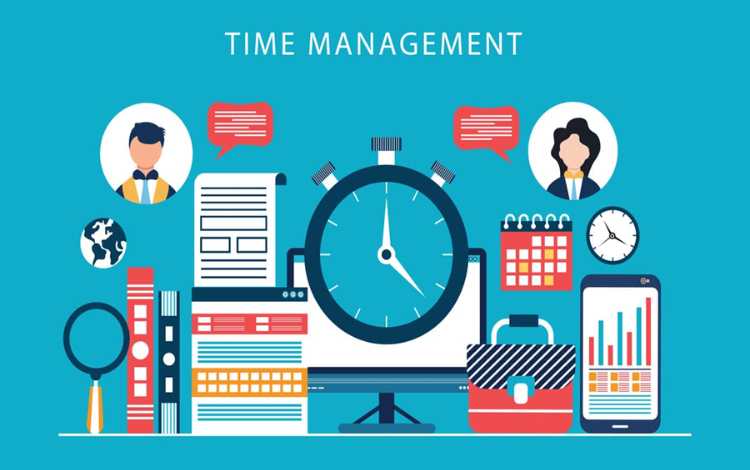
Whether you work for yourself or for an employer, time management skills are essential. The more control you have over your hour-by-hour work routine, the more vital time management skills become.
Whether it is simply being able to move from one task to the other effectively and without undo distraction, managing effective employee time tracking, or more in-depth management of the workday and workload, these ten tips can help any employee improve their time management skills!
What Is Time Management, and Why Is It Important?
As noted by ProofHub, “Time management is the process of planning and exercising conscious control of the time spent on specific activities to work smarter than harder. It is a juggling act of various things that help you increase efficiency and strike a better work-life balance.
Browse our online courses on meditation, positive thinking, overcoming procrastination, and freedom from distractions.
Improving your time management at work allows you to enhance your performance and achieve your desired goals with less effort and more effective strategies.”
However, poor time management skills and a lack of clear and concise employee time tracking in the workplace can have far-reaching effects that include:
- Skipped deadlines, late assignments, poor scheduling, and missed appointments.
- Procrastination, dilly-dallying, idle work, downtime, and general lack of focus.
- Lack of professionalism and poor view of employee work ethics.
- Inefficient workflow, low completion rate, and low work quality.
- Unwanted stress added aggravation, increased frustration, and decline in quality.
- Conflicts with an employer, strained workplace relationships, less comradery.
- Financial penalties, legal fees, lost income, fees and expenses, loss of job.
- Work and life imbalance and added stresses at home and in personal life.
We, of course, want to avoid these things in our lives! So, let’s check out the tips and see how they can be applied to your work routine today.
Prioritize Tasks
Write out all the tasks you need to get through for the day. List them and prioritize them using a system like the Eisenhower Matrix. The goal is to give everything on your list a certain rank based on importance and urgency.
Action Tip: Each morning, jot down your asks for the day and give them a ranking based on priority or importance and use that to stay on track for the day!
Set SMART Goals
Define goals for your work day or week that follow the SMART guidelines. These are goals that are Specific, Measurable, Achievable, Relevant, and Time-bound and will provide clear direction for your current to-do list.
Action Tip: Write down your goals in SMART and view them to see how they are tracking and what adjustments you need to make to any remaining goals.
Use a Planner
Traditional pen-and-paper note-taking has stood the test of time because it helps the brain focus and remember important goals and information. Using a digital calendar or a physical planner helps you schedule and stay on track.
Action Tip: Spend a few minutes each day planning current tasks as well as looking at tomorrow’s tasks and appointments, so you are not caught off guard.
Time Blocking
One handy tip to improve time management while on the clock is to practice time blocking. Allocate fixed time slots in your calendar for deep work without interruptions. You can set aside specific blocks for specific tasks each day.
Action Tip: Deep focus blocks of time need to be protected so you’re not checking emails or taking calls, and so co-workers know not to interrupt you needlessly.
Pomodoro Technique
Another structured form of scheduling and organizing Pomodoro is handy for maintaining focus throughout the day.
With this method, you break the day into 30-minute blocks with 25 minutes of work and a 5-minute break.
Action Tip: Use a timer and only focus on one task or batch of related tasks that you have already identified during each Pomodoro session you have scheduled.
Limit Multitasking
Focus on one task at a time to increase the quality of work and reduce stress. Continuously switching between tasks can decrease efficiency, so avoiding multiple ongoing projects can make you more effective at all your tasks.
Action Tip Close unnecessary browser tabs and apps, turn off the phone, add a ‘do not disturb’ sign to the door, and do whatever you need in order to get time to focus.
Set Deadlines
Deadlines can inspire a sense of urgency and prevent procrastination. Even if there are tasks with no official deadline or general ones like ‘end of the week, give them specific deadlines for yourself to help avoid the temptation to put them off.
Action Tip: For each task, add a deadline to your planner or calendar, and treat even the self-imposed ones as if they were given by your employer.
Delegate and Outsource
If possible, delegate or outsource tasks whenever necessary and share the workload among your co-workers as you are allowed and able to. If a task does not require your specific expertise, see if it can be delegated to someone else.
Action Tip: If you are part of a work team, discuss tasks together and see what assignments can be interchanged among the group to maximize efficiency.
Group Similar Tasks
Working on similar tasks at the same time to complete in single blocks can greatly reduce the constant back and forth between types of work.
All accounting work, research, and customer calls can be worked on in their own blocks.
Action Tip: Increase efficiency by doing similar tasks consecutively and focus on all related tasks in one go, like replying to emails or making phone calls.
Regular Breaks
Studies have shown time and time again that breaks, even as little as 5-10 minutes every hour, can significantly improve focus, mood, performance, and attitude.
All of this contributes to better results and easier time management.
Action Tip: Even if you can’t take a break for a short 5-minute walk, take a short pause after every hour of work to stand and stretch and take a few deep breaths.

Conclusion
Effective time management in the workplace remains vital for successful operations day in and day out.
Having a clear and easy-to-use process for employee time tracking and monitoring is vital to short and long-term productivity goals. This is not just true for the individual employees but for their work teams, the employer, and the company or business as a whole.
It’s not about working harder but working smarter to achieve more in less time.
With these ten tips in mind, you can become a time-management expert and be the employee employers love to have around and the coworker everyone wants to work with!

